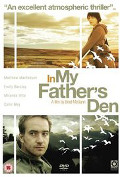
Directed by
Brad McGann
126 minutes
Rated MA
Reviewed by
Sharon Hurst

In My Father's Den
Synopsis: Photojournalist Paul Prior (Matthew Macfadyen) returns home for his father's funeral after an absence of 15 years to confront hostility from his brother Andrew (Colin Moy), reacquaintance with his ex-girlfriend Jackie (Jodie Rimmer), and the discovery that Jackie has a 16-year-old daughter Celia (Emily Barclay), who he befriends. Most of all he must face the traumatic incidents in his past that caused him to leave.
Such a synopsis barely scratches the surface of the intricacies and complexity of this lyrical, dark film which grapples with a whole raft of issues and emotions. Based upon a book of the same title by Maurice Gee, and which is somewhat of a whodunit, this film seeks to explore the whys of what has happened, and the emotional baggage that each of the characters carries, along with suppressed truths and buried secrets. It is a beautifully crafted piece with careful attention to contrasting settings, recurring images, a complex time structure, and an insightful script complemented by several superb performances.
Central Otago, where the film is set and shot provides some stunning scenery with expansiveness and beauty that is in magnificent contrast to the claustrophobia of Andrew's home town and the dark secrets of his father's den. Many of the recurring images such as maps of the world, trains, and spilt wine all serve to subtly press home the film's themes. Although the plot starts in a seemingly straightforward and almost slow manner, with the funeral and reuniting of the brothers, it soon establishes a near-palpable sense of the past and simmering conflict. When it takes a turn mid-way, after the disappearance of Celia, we then see how painstakingly the timeline has been constructed, with incidents happening in three different time frames, all careful not to reveal too much, but building upon the bigger picture until the harrowing denouément and revelations near the film's end.
The use of music is an inspiration: early scenes of young Paul in the den listening to achingly beautiful opera sung by Kiri te Kanawa are followed later by he and Jackie playing Patti Smith's quintessentially 80s throbbing music as a backdrop to their young passion and dreams of a future which never eventuates as planned. Almost as important is the use of spoken prose: Celia's creative writing is used as a voiceover in parts and mirrors in an exquisite, but painfully tragic, way the actual plot of the film.
But it is the outstanding performances that really impressed me. Talented new-comer Emily Barclay imbues Celia with an almost gauche authenticity that captures the enthusiasm, dreams and pain of adolescence; Macfadyen broods his way with tortured intensity as a man unable to emotionally engage, and yet with an underlying warmth that is slowly revealed via his relationship with Celia. Smaller roles are also noticeably terrific with Miranda Otto giving another fine performance as Andrew's tormented wife and Jimmy Keen strong in the small role of Jonathan, Andrew's son.
My one criticism is that the quality of the sound was not brilliant - at times one had to strain to understand the characters' dialogue. What a shame this had to detract from such a compelling, resonant, and deeply emotional film.

Want more about this film?


Want something different?




